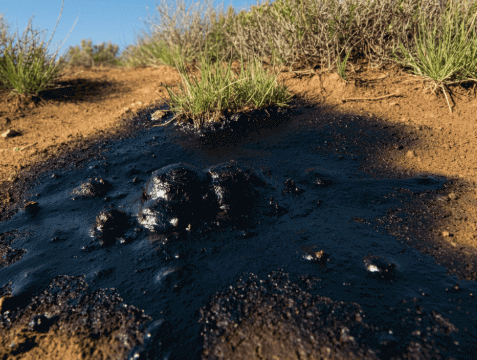Finding out your property has valuable resources can be a game-changer. An oil well alone can produce between 10 and 400 barrels daily. This guide provides a simple starting point for learning how to find oil on your land, covering the initial signs and steps you can take. Understanding the geological indicators and historical data for your region is a critical first move in this exciting process. While the journey to discovery can be complex, you don’t have to navigate it alone. Renowned real estate investors and land buyers, Steve Daria and Joleigh, offer expert guidance to landowners exploring the potential of their properties. They can help you understand the next steps, whether you’re just starting to wonder how to find oil on your land or are ready to explore the option of selling. To simplify your journey and get professional insight, book a free discussion with their team today.
Key Points
- Investigate Your Property’s History: The initial step involves researching the history of your land and the surrounding region. You should check public records for any past oil and gas exploration and review geological surveys to determine if your area is known for hydrocarbon deposits.
- Identify Surface-Level Indicators: Physical clues on the surface can help you find oil on your land. Look for oil seeps, where crude oil naturally rises to the surface, or listen for a faint bubbling sound in damp areas, which may indicate the presence of gas.
- Confirm Mineral Rights Ownership: It’s important to find out who owns the mineral rights to your property, as they may be separate from surface ownership. A thorough title search will clarify if you possess the legal right to extract and profit from any resources discovered.
- Engage with Geological Professionals: To get a definitive assessment, you will need to hire experts like geologists or petroleum engineers. They can analyze geological data and conduct seismic surveys to evaluate the likelihood that you will find oil on your land.
- Prepare for Professional Exploration: If the initial signs are favorable, the next stage is professional exploration, which often includes drilling an exploratory well. This step requires a significant financial investment but is the only certain way to confirm the presence and volume of oil.
What are the first signs that there might be oil on my land?
Identifying the first signs of oil on your land often involves looking for specific clues on the surface and researching the history of your area.
One of the most telling signs is the presence of an oil seep, where crude oil naturally leaks to the ground’s surface, creating a tar-like puddle.
You might also notice a distinct petroleum smell, similar to gasoline or asphalt, especially in damp areas or near creeks.

Another indicator can be found in historical records; check local and state geological surveys for any documented oil and gas activity in your region.
Sometimes, the type of vegetation, or lack thereof, can also hint at what lies beneath the soil.
While these clues are a good starting point, they do not guarantee a significant oil reserve.
These initial observations are the first step in learning how to find oil on your land.
Confirming the presence of oil almost always requires professional geological analysis.
Ultimately, combining visual inspection with historical research provides the most accurate initial assessment.
Get Started: Get Your Cash Offer Below…
We are direct land buyers. There are no commissions or fees and no obligation whatsoever. Start below by sharing where your property is and where we can send your offer…
How do surface rights differ from mineral rights on a property?
It’s important to understand the difference between surface rights and mineral rights, as they are two separate types of property ownership that can belong to different people.
Surface rights give you ownership of the land’s surface, allowing you to build a house, farm, or use the property for other surface-level activities.
Mineral rights, on the other hand, give the owner the legal authority to explore, extract, and sell the resources found beneath the surface, such as oil, gas, and coal.
This means someone could own the surface of a property while another person or company owns the minerals below it.
This concept is known as a “split estate” and is quite common in resource-rich areas.
Before you investigate how to find oil on your land, you must first conduct a title search to confirm that you own the mineral rights.
If you only own the surface rights, you cannot legally profit from any oil discovered.
Therefore, verifying ownership of your mineral rights is one of the most important steps in this entire process.
What are the costs associated with hiring a geologist to survey my land for oil?
- Initial Consultation Fees: Many geologists charge an initial fee for a basic assessment, which can range from a few hundred to a few thousand dollars. This first meeting helps them review existing data and determine if a more detailed survey is worthwhile.
- Geological Data Analysis: Before visiting your property, a geologist will analyze public records, maps, and historical survey data to understand the area’s potential. This research phase is a crucial step in identifying potential oil reserves on your land and is included as part of their professional services.
- Surface-Level Fieldwork: A geologist will need to physically walk your property to look for surface clues and map geological formations. The cost of this fieldwork is often billed on a daily or hourly basis, plus any associated travel expenses.
- Seismic Surveying Costs: For a more in-depth analysis, a seismic survey is often required, which can be the most expensive part of the process. This advanced step in knowing how to find oil on your land can cost tens of thousands of dollars, as it involves specialized equipment and a dedicated crew.
- Final Report and Recommendations: The geologist will compile all findings into a comprehensive report that outlines the potential of your property and provides recommendations. The cost for this detailed report is typically included in the overall project quote.

What are the environmental risks involved in exploring for oil on my land?
Exploring for oil on your land involves several potential environmental risks that you should carefully consider.
The exploration process, particularly seismic surveys and exploratory drilling, can cause significant ground disturbance and disrupt local ecosystems and wildlife habitats.
There is also a risk of water contamination, as drilling fluids or accidental spills could seep into groundwater, streams, or ponds.
Noise pollution from heavy machinery and increased traffic during operations can also negatively impact the surrounding environment and nearby residents.
As you learn more about how to find oil on your land, it is important to understand these potential consequences.
Proper planning, adherence to strict environmental regulations, and collaboration with experienced and responsible operators can help minimize these risks.
Before beginning any exploration activities, it is wise to conduct an environmental impact assessment to fully understand the potential effects.
This allows you to make a well-informed decision, safeguarding the long-term health of your property.
Should I lease my mineral rights to an oil company or try to develop them myself?
- Financial Investment and Risk: Developing mineral rights on your own requires a massive upfront investment for surveys, drilling, and equipment, with no guarantee of success. Leasing to an oil company eliminates this financial risk, as they cover all exploration and production costs.
- Expertise and Management: Learning how to find oil on your land and extracting it is a highly complex process, demanding expertise in geology, engineering, and legal frameworks. By leasing, you transfer all management and operational responsibilities to the experienced oil company.
- Potential for Profit: While leasing provides a steady income through bonus payments and royalty checks, the potential profit is a small fraction of the total revenue. Developing the rights yourself means you keep all the profits, which could be life-changing if the well is successful.
- Liability and Regulations: Self-development means you are fully responsible for all legal, environmental, and safety regulations, which can be a heavy burden. When you lease, the oil company assumes liability, protecting you from potential issues that arise during the process of knowing how to find oil on your land.
- Speed and Simplicity: Leasing is a much faster and simpler process that can provide you with income relatively quickly, without the need to manage a complex project. Self-development is a long-term commitment that can take years to yield any return on your investment.
What legal steps are required before drilling an exploratory well on my land?
Before you can begin drilling an exploratory well, there are several critical legal steps you must complete to ensure you are compliant with all regulations.
First, you must have definitive proof that you own the mineral rights to your property, which can be confirmed through a thorough title search.
Next, you will need to obtain the necessary drilling permits from local, state, and sometimes federal agencies, which is often a complex application process.
You will also need to create a detailed drilling plan and a surface use agreement, especially if the surface and mineral rights are split.
This agreement outlines the procedures for accessing and restoring the surface after operations are complete.
It’s a crucial part of the process after learning how to find oil on your land.
Additionally, you must secure insurance to cover potential environmental damage or accidents.
Working with an experienced oil and gas attorney is highly recommended to navigate these legal requirements correctly.
For expert guidance on these legal steps, schedule a free consultation with a professional today.
**NOTICE: Please note that the content presented in this post is intended solely for informational and educational purposes. It should not be construed as legal or financial advice or relied upon as a replacement for consultation with a qualified attorney or CPA. For specific guidance on legal or financial matters, readers are encouraged to seek professional assistance from an attorney, CPA, or other appropriate professional regarding the subject matter.
